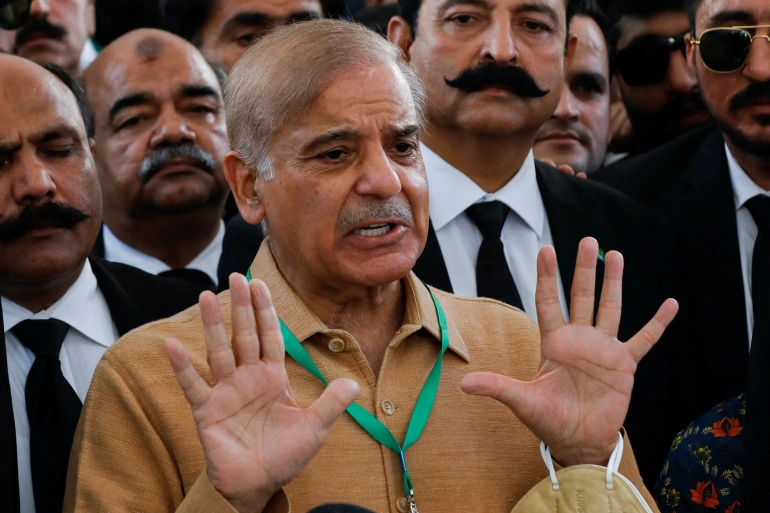Imran Khan lost a no-confidence vote, and Shehbaz Sharif has filled an application as Prime Minister Candidate. The move has been opposed by Imran Khan’s party.
On Sunday, Pakistan’s leader of the opposition, Shebaz Sharif, nominated himself for the Prime Minister post. Imran Khan had been removed from office after he lost a no-confidence vote. This makes Mr. Khan the first Prime Minister in Pakistan’s history lose a no-confidence vote.
The joint opposition by socialist, radically religious, and liberal parties nominated Sharif for the Prime Minister post. Pakistan Tehreek-e-Insaf [PTI], Imran Khan’s party, nominated Shah Mahmood Qureshi as its candidate. The National Assembly Secretariat accepted Shehbaz Sharif and Mahmood Qureshi’s nomination papers after rejecting opposition from PTI on Mr. Sharif’s nomination.
Sharif’s candidature was challenged by Baber Awab of PTI on grounds that the Pakistan Muslim League -Nawaz [PML-N] leader faced several court cases.
PTI will be withdrawing its politicians from the National Assembly. It has also been decided that an opposition movement will be started against the new government, most likely headed by three-time Punjab Chief Minister Mr. Sharif.
The elections for the new leader will take place on Monday in the National Assembly.172 votes are required to win the majority in the house of 342 members. Imran Khan lost the no-confidence motion since the opposition had accumulated 174 votes.
Challenges at the hand of Shehbaz Sharif:
Shehbaz Sharif will have to tackle multiple challenges right from the beginning if he gets elected as the new PM. Having control over the multitude of ideologies and parties that have supported Sharif and his candidature would be difficult.
The parliament is to complete its five-year term in August next year. Moreover, Pakistan faces severe economic struggles at the moment and needs to be sorted out. High inflation, debt, and low currency rates have contributed to the stagnant growth of the country.
Any chance at economic revival would require radical policy reforms. The inflation rate is at 12% and the foreign debt is 130 billion dollars. An aid package from the IMF would only be possible at the cost of subsidies and improvements in government processes.
Rising militancy is another critical issue at hand. Pakistan’s Taliban, that share common origins with Afghanistan’s Taliban, have increased their attacks recently. They have threatened to attack government forces during the holy period of Ramadan.
Previous attempts of negotiations under Imran Khan had stalled. In the Balochistan area of Pakistan, demands for greater autonomy and wealth have been raised by separatists.
Pakistan’s foreign relations are marred by challenges at the moment. Imran Khan had angered the west by visiting Moscow on the day Ukraine was invaded.
He was also seen attending the opening of the Beijing Winter Olympics, which most countries had boycotted due to China’s poor track record on human rights.
Although Imran Khan has lost power, his successor will inherit the same critical challenges.
Published by Diwakar Kumar
Edited by: Aaradhana Singh
READ MORE: 2002 Gujarat riots: Teesta Setalvad rejects the accusations of the SIT













